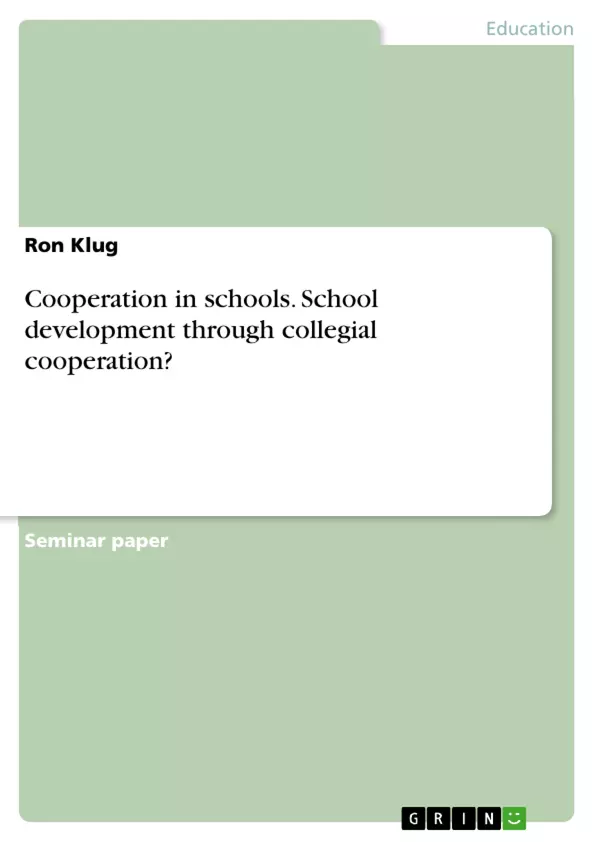Excellent work on cooperation and cooperation processes in schools. It is shown how collegial cooperation and team development can contribute to the development of schools.
The work was written as part of a qualifying course of study "Master for School Management". The author is actively involved in the school service as a teacher.
Following the logic of the proverb, he who works alone also reaches his goal. But this may take longer or the result may not be as satisfactory as it could be through collaboration. Various modalities of work practice are also available in the context of educational work in schools. In addition to the lone worker who plans lessons alone, teaches alone, reflects alone, and solves all problems alone, there are various ways of working together. Schley (2011) refers to the model of the classic lone worker as the "one man model." This must be questioned in the context of school development because individuals cannot develop a school alone. School development can only occur collaboratively. Collegial collaboration in schools has always existed, but often only informally and with little institutionalization.
In the literature on school development, teacher cooperation is considered the basis for professional action by teachers in school (cf. Bonsen 2010, p. 289f.). School development research also emphasizes the importance of cooperation for adequate educational provision for students. However, it is not entirely unproblematic to speak of cooperation, because different forms of collegial cooperation can be distinguished from each other, e.g. exchange, division of labor, and coconstruction, which have different functions in everyday school life (cf. Fussangel and Gräsel 2010, p. 258).
Cooperation is an integral part of the everyday practice of teachers. Since school development processes are not possible in isolation, this thesis places cooperation in the system context of school development. To this end, the second chapter first provides a basic approach to the concept of cooperation. After a definition of the term, the forms and prerequisites of cooperation are presented. In the third chapter, the contextual conditions are considered. [...]
Table of Contents
- Introduction
- Approaching the concept of cooperation
- Definitions
- Forms of cooperation
- Tax groups
- Vintage teams
- Sections
- Class teams
- Prerequisites for cooperation
- Cooperation in the context of school development
- Changing schools
- Cooperation as a focus of school development
- From I to We
- Group and Team
- Professional learning communities
- System Leadership
- Networking in concrete terms
- Possibilities and limits of cooperation
- Potentialities
- Limits
- Practical reflections
- Conclusion
Objectives and Key Themes
This term paper aims to explore the significance of cooperation within school development, focusing on how collegial cooperation can contribute to the improvement of educational practices and the overall effectiveness of a school. The paper examines various forms of cooperation, analyzes the prerequisites for its successful implementation, and delves into the potential benefits and challenges associated with fostering a collaborative environment in schools.
- The concept and definitions of cooperation in educational settings
- Different forms of cooperation within schools, including their potential for school development
- The changing demands on schools and pedagogical work in relation to the importance of cooperation
- Team development and other strategies to enhance school development through cooperation
- The benefits and limitations of cooperation, including practical reflections on its implementation
Chapter Summaries
The first chapter introduces the concept of cooperation in schools and its relevance to school development. It draws a parallel between the Arabic proverb and the benefits of collaboration in the context of pedagogical work, highlighting the shift from individual work to collective efforts. The chapter emphasizes the importance of collegial cooperation in school development and discusses the challenges associated with different forms of cooperation.
The second chapter provides a detailed analysis of the concept of cooperation. It delves into definitions, explores various forms of cooperation within schools, and examines the prerequisites for successful collaboration. The chapter also discusses the distinction between individual, organizational, and systemic perspectives on cooperation, highlighting the multifaceted nature of this phenomenon.
Chapter three examines the context of school development and how cooperation plays a crucial role within it. It explores the changing demands on schools and pedagogical work, emphasizing the need for collaboration in addressing these challenges. The chapter further examines the responsibilities of school management in fostering a collaborative environment and considers cooperation as a key focus area for school development.
The fourth chapter delves into the development of teams and other strategies for fostering school development through cooperation. It explores concepts such as professional learning communities, system leadership, and concrete strategies for networking within schools.
Keywords
The key terms and concepts explored in this work include: school development, collegial cooperation, team development, professional learning communities, system leadership, pedagogical work, educational settings, and school organization.
- Arbeit zitieren
- Ron Klug (Autor:in), Cooperation in schools. School development through collegial cooperation?, München, GRIN Verlag, https://www.grin.com/document/1235817



